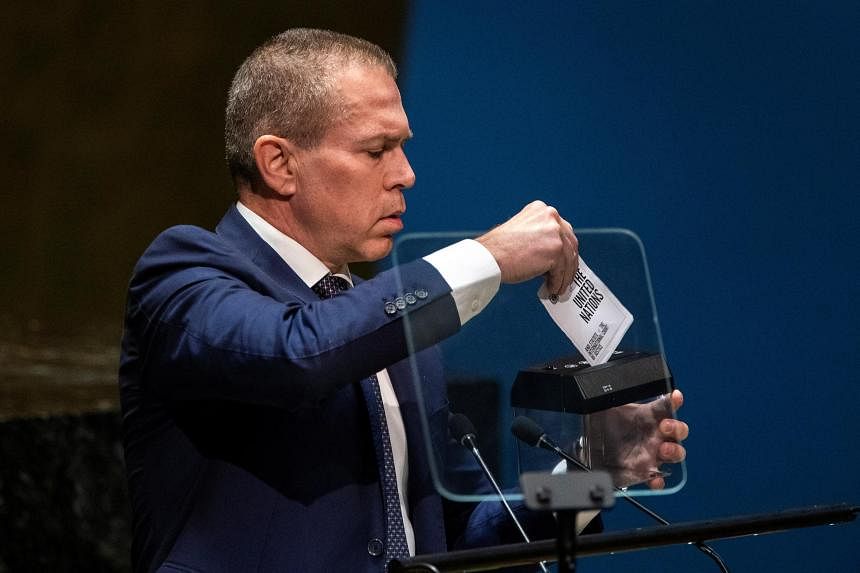News analysis
UN resolution supporting Palestinian statehood shows many care about Israel’s future

LONDON - Israel has reacted furiously to the United Nations General Assembly’s May 10 decision to support Palestine’s bid to become a full member of the international organisation.
Mr Gilad Erdan, Israel’s Ambassador to the UN, delivered a fiery rebuke, accusing the body of betraying both Jews and its founding treaty.
“Shame on you,” he shouted at the General Assembly while holding a small paper shredder into which he fed pages from the UN Charter.
Mr Erdan’s theatrical performance was not only undignified, it was also unjustified, for many among the 143 out of the General Assembly’s 193 member states that voted for Palestine’s eventual membership did so precisely because they care deeply about the future of Israel.
Far from “hating Jews”, nations that backed the resolution – which included Singapore – did so as friends “of both Israel and Palestine”, as Singapore’s Minister for Foreign Affairs, Dr Vivian Balakrishnan, put it.
Although Prime Minister Benjamin Netanyahu’s Israeli government is evidently determined to ignore the decision, many Israeli politicians tacitly accept Dr Balakrishnan’s argument that the UN resolution signals “that the status quo is not enough, and we need a reset, a restart of diplomatic efforts”.
The idea that the only solution to the Israel-Palestine conflict lies in the creation of two states – one for Jews and one for Palestinian Arabs – has governed the actions of the international community for more than half a century.
It was also accepted by most Israeli and Palestinian leaders as their ultimate negotiating objective for at least a quarter of a century.
The dispute was often about the speed of the creation of a Palestinian state, the borders this state should enjoy and the obligations it would assume, but not about the principle itself.
Who was responsible for the failure to achieve a two-state solution remains a hotly debated matter.
Earlier this week, former US secretary of state Hillary Clinton claimed that if Palestinian leaders had accepted a plan put forward during the 1990s by then President Bill Clinton, her husband, “there would have been a Palestinian state now for about 24 years”.
Mrs Clinton, criticising US campus protesters, had implied the young people did not know that, had former leader of the Palestinian Authority Yasser Arafat accepted the deal, the Palestinians would already have a state.
Others beg to differ with this interpretation. Yet nobody doubts that since Mr Netanyahu returned to office in December 2022, the very concept of a two-state solution has been challenged.
Mr Netanyahu and his coalition partners represent the most right-wing government in Israel’s history.
Most of Mr Netanyahu’s ministers support the expansion of the illegal settlements on occupied Palestinian lands.
Some ministers have even openly called for the killing or mass expulsion of Palestinians. Their dream of a Greater Israel consists of wanting the land but not the people.
Officially, Mr Netanyahu has not ruled out a two-state solution to the conflict with the Palestinians.
In practice, however, he has done everything possible to avoid negotiations with any Palestinian representative, however moderate. Mr Netanyahu’s entire policy of reaching out to Arab governments in the Middle East is based on the claim that the Palestinians are a sideshow, an irrelevance best ignored.
That assumption blew up in Mr Netanyahu’s face on Oct 7, 2023, when Hamas, the Palestinian militant organisation in charge of Gaza, struck at Israel, killing over 1,200 Israelis.
Yet instead of drawing the appropriate political lessons from this massacre, Mr Netanyahu persists in a diplomatic dead-end: he remains pledged to “destroy” Hamas regardless of the civilian casualties in Gaza, while at the same time refusing dialogue with the moderate Palestinian Authority.
Meanwhile, equally ominous trends are evident in the Palestinian camp.
A study just released by a group of Israeli academics in cooperation with the Palestinian Centre for Policy Research and Surveys indicates that the roots of the Oct 7 calamity could be traced to the beginning of 2023, when “Palestinian society underwent a significant change of consciousness regarding the conflict, regarding the Palestinian leadership, and especially regarding its preferred pattern of struggle for independence”.
The authors of the report found that while a decade ago, more than half of the Palestinian public supported a two-state solution, this support had dropped to 40 per cent by the time Mr Netanyahu returned to office and slumped to 27 per cent in 2023.
And while only 37 per cent of the Palestinian public supported the use of violence against Israel two years ago, 57 per cent approved of violence against Israel by September 2023, a month before Hamas struck.
Nothing can justify Hamas’ mass murder of Israelis. Still, it is clear that the current political impasse, coupled with the Gaza war, promises only further horrors.

In strictly legal terms, a good case can be made that the Palestinians – who currently lack a single government, do not have fixed borders and are not in control of their territory – do not qualify as a sovereign state.
Furthermore, even if they qualified, membership in the UN is dependent on a favourable recommendation of the Security Council, which the US has vetoed and will continue to block.
So, in many respects, the latest General Assembly resolution has only a symbolic impact. It will, among other minor concessions, allow a Palestinian delegation to take its place in alphabetical order in the seating arrangements of the General Assembly rather than be stuck at the back of the hall.
The resolution was also watered down to avoid a backlash from the US government, which is bound by a US congressional law mandating a stop to any American funding for the UN should the organisation grant Palestine full membership.
But even in its present diluted format, the resolution will operate as a reminder to the Israeli government that the more it tries to ignore the Palestinians, the more a Palestinian entity will become an accomplished fact that no Israeli authority can ignore with impunity.
While that may not count for much with Mr Netanyahu, it may count with a future Israeli government likely to come to office as a result of early elections, which are almost guaranteed to take place in Israel soon after the current Gaza war stops.
As Mr Riyad Mansour, the Palestinian UN envoy, put it after the General Assembly resolution was adopted, the vote was not so much “against any state”, but it could be seen as a future “investment in peace”.
https://news.google.com/rss/articles/CBMigwFodHRwczovL3d3dy5zdHJhaXRzdGltZXMuY29tL3dvcmxkL21pZGRsZS1lYXN0L3VuLXJlc29sdXRpb24tc3VwcG9ydGluZy1wYWxlc3Rpbmlhbi1zdGF0ZWhvb2Qtc2hvd3MtbWFueS1jYXJlLWFib3V0LWlzcmFlbC1zLWZ1dHVyZdIBAA?oc=5
2024-05-11 16:00:04Z
CBMigwFodHRwczovL3d3dy5zdHJhaXRzdGltZXMuY29tL3dvcmxkL21pZGRsZS1lYXN0L3VuLXJlc29sdXRpb24tc3VwcG9ydGluZy1wYWxlc3Rpbmlhbi1zdGF0ZWhvb2Qtc2hvd3MtbWFueS1jYXJlLWFib3V0LWlzcmFlbC1zLWZ1dHVyZdIBAA
Tidak ada komentar:
Posting Komentar